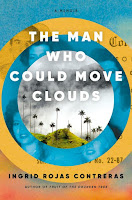Author: Ingrid Rojas Contreras
Publication Information: Doubleday. 2022. 320 pages.
ISBN: 0385546661 / 978-0385546669
Rating: ★★★
Book Source: I received this book through NetGalley free of cost in exchange for an honest review.
Opening Sentence: "They say the accident that left me with temporary amnesia is my inheritance."
Favorite Quote: "There was a difference between keeping knowledge secret, and living in secret. I could do the former, but I would not do the latter."
Ingrid Rojas Contreras biggest acknowledgment of this book credits her mother. "Thank you, most of all, to my mother, who told me stories, and in telling me stories, taught me how to live." The stories are of family, love, Colombian heritage, and of sight and magic.
The impetus for this book is an accident and a shared dream. An accident leaves Ingrid Rojas Contreras with temporary amensia for a period of weeks. She learns that her mother too suffered an accident as a child that left her with certain abilities that were her heritage. "They say the amnesias were a door to gifts we were supposed to have, which Mami's father, Nono, neglected to pass."
Nono is at the heart of this story. Nono, was a curandero, a traditional healer (like a shaman) gifted with "instructions for talking to the dead, telling the future, healing the ill, and moving the clouds." A dream that both the author and her mother have leads them on a quest back to Colombia to disinter and free Nono from the demands and the wishes people leave at his grave. Those requests keep him tethered.
"This is a memoir of the ghostly - amnesia, hallucination, the historical specter of the past - which celebrates cultural understanding of truth that are, at heart, Colombian. The stories in this memoir are the true lived experience of those who lived it, as told to me."
The cultural history in this book is fascinating. The story weaves back and forth between the present to stories of the past - the author, her mother, Nono, and other relatives. At times, the thread is difficult to follow. After a while, I stop trying to follow the chronology and float along on what is at most times a mythological journey. However, that approach disengages from any emotional impact of the book. It is more like reading a story than a memoir. In fact, I have a hard time remembering this is a memoir.
Perhaps, a more focused approach on one or two main story threads may have been a more emotionally compelling book. Perhaps, some greater explanation of the cultural paradigm underlying the curandero would be beneficial in grounding the book for a reader not familiar with the culture and ritual. With the myriad stories and the lack of a cultural context, I am not sure I completely understand the family story being told.
Please share your thoughts and leave a comment. I would love to "talk" to you.

No comments:
Post a Comment